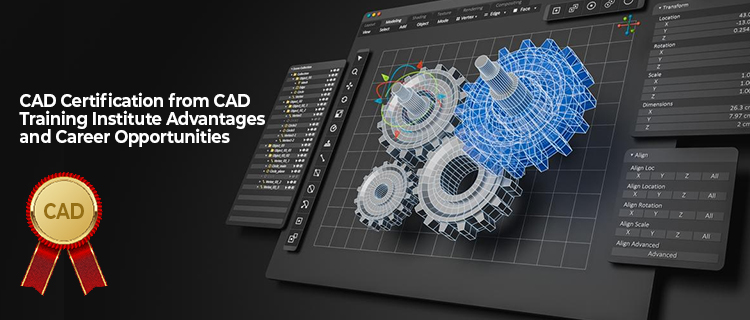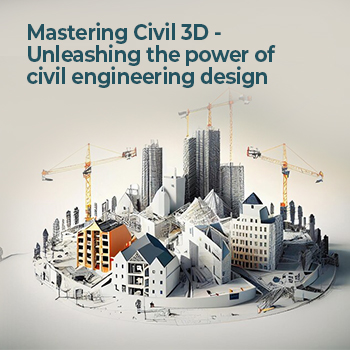
CAD Certification from CAD Training Institute: Advantages and Career Opportunities
What is CAD?
Certification in Computer-Aided Design (CAD), commonly known as CAD Certification, signifies the successful completion of a program that typically spans 6 months to 1 year. This program is dedicated to exploring the complexities and practical applications of CAD technology. It demonstrates an individual's acquisition of the knowledge and skills necessary to create designs, drawings, and models crucial in professions like design, engineering, and architecture. The curriculum covers various CAD-related approaches, techniques, and tools, encompassing both theoretical and practical learning.
The Significance of CAD Certification
A Certificate in Computer-Aided Design (CAD) is highly valuable for developing analytical, drawing, quality control, and numerical control abilities. CAD has become indispensable in industries such as architecture, engineering, and design due to its expanding role in the creative process. Professionals can efficiently oversee the creation of digital drawings, blueprints, and plans with advanced CAD applications. The addition of 3D modeling and visualization to these applications, surpassing 2D drafting, has revolutionized the realization of designs. This transformation is credited to the capabilities of CAD programs.
Why Choose a CAD Training Institute for Your Certification?
Obtaining CAD Certification from a reputable CAD training institution offers several benefits:
Industry recognition and Credibility: CAD certificates are widely recognized as a standard for proficiency in the field of computer-aided design. Professionals holding these certificates are esteemed both nationally and internationally. Employers place a high level of confidence in individuals with CAD certifications. When making hiring decisions, they often favor candidates who have demonstrated their commitment to understanding CAD tools and processes through formal certification programs. CAD qualifications enhance the credibility of professionals in the eyes of clients and stakeholders. Whether working on engineering designs, architectural projects, or product development, certified experts are relied upon to deliver work of the highest caliber and precision.
Expanding career horizons:
CAD certifications open doors to a wide range of career options across various industries. CAD skills are in demand in diverse sectors, including engineering, architecture, automotive design, and aerospace. With CAD certification, professionals can specialize in specific areas such as structural engineering, industrial design, or urban planning, enabling tailored career paths and skill development. Certified CAD professionals are well-equipped to engage in research and innovation, contributing to cutting-edge technology and design methodologies, thereby expanding their career prospects. Given the rapid evolution of CAD technology, certified professionals are encouraged to continue their education to stay current with industry trends and maintain career adaptability.
Professional growth and development:
Attaining CAD certification signifies a commitment to skill enhancement, allowing professionals to continually refine their design and drafting skills and remain competitive in their industry. Certified CAD professionals often experience accelerated career advancement, securing promotions, leadership positions, and higher-paying roles. These professionals are well-positioned to innovate, work on groundbreaking initiatives, adopt cutting-edge technologies, and advance their respective industries. CAD certification programs often facilitate networking opportunities, providing professionals with the chance to connect with peers, share ideas, and potentially find mentors to aid in their career advancement. Teaching and training responsibilities, which may result from CAD certification, can also be a rewarding aspect of professional development.
Competitive Advantage in the Job Market:
CAD certification sets candidates apart in job applications by demonstrating specialized knowledge of computer-aided design. Employers seeking CAD-certified professionals are more likely to consider them as attractive prospects due to their certification. With CAD certification, candidates can apply for a wider range of positions in fields such as engineering, architecture, manufacturing, and more, broadening their employment prospects. Once employed, CAD certification can expedite career progression, positioning individuals for promotions and roles with greater compensation and responsibility. Employers often have confidence in certified CAD professionals to lead teams or projects, offering opportunities to demonstrate leadership skills.
Industry-Specific Benefits:
CAD certification offers distinct advantages in various sectors. For engineers, it streamlines the product development process by facilitating the creation of precise detailed designs, simulations, and prototypes, improving collaboration within engineering teams. In architecture, CAD-certified professionals can create accurate architectural blueprints, 3D models, and walkthroughs, enhancing client interaction and project visualization. In manufacturing, CAD certification optimizes design and production processes, enabling the creation of 3D models for manufacturing components and assemblies, resulting in reduced production costs and higher product quality. Construction professionals with CAD certifications can provide comprehensive drawings and blueprints, ensuring proper project execution and compliance with regulations.
Choosing the Right CAD Training Institute
Choosing the appropriate CAD training institution is crucial for several reasons. Reputable CAD training institutions offer high-quality education, ensuring a comprehensive understanding of CAD software and techniques. This education equips individuals with the skills needed for career success. Training institutions with strong reputations provide certifications that are recognized and respected by employers, enhancing employability and credibility in the job market. The right institution may also offer networking opportunities with instructors and fellow students, which can be valuable for future collaborations and professional growth. Institutions with a specific industry focus, such as architecture or engineering, may offer specialized courses tailored to industry needs, enhancing competitiveness in chosen fields.





 Testimonials
Testimonials Video Testimonials
Video Testimonials News & Events
News & Events Course Enquiry
Course Enquiry Achievements
Achievements Job Opportunities
Job Opportunities Image Gallery
Image Gallery Video Gallery
Video Gallery Overview
Overview Vision Mission
Vision Mission Collaboration
Collaboration Careers
Careers Contact Us
Contact Us






